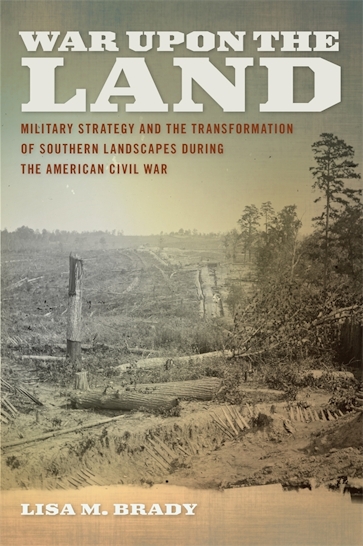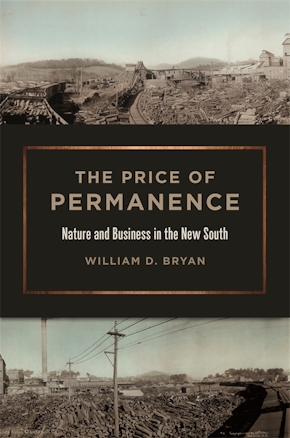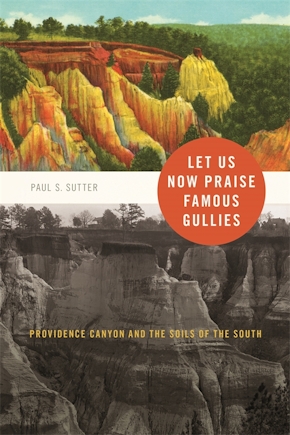War upon the Land
Military Strategy and the Transformation of Southern Landscapes during the American Civil War
Title Details
Pages: 208
Illustrations: 6 b&w photos
Trim size: 6.000in x 9.000in
Formats
Paperback
Pub Date: 04/01/2012
ISBN: 9-780-8203-4249-8
List Price: $26.95
Hardcover
Pub Date: 04/01/2012
ISBN: 9-780-8203-2985-7
List Price: $120.95
eBook
Pub Date: 04/01/2012
ISBN: 9-780-8203-4383-9
List Price: $26.95
War upon the Land
Military Strategy and the Transformation of Southern Landscapes during the American Civil War
Skip to
- Description
- Reviews
- Awards
In this first book-length environmental history of the American Civil War, Lisa M. Brady argues that ideas about nature and the environment were central to the development and success of Union military strategy.
From the start of the war, both sides had to contend with forces of nature, even as they battled one another. Northern soldiers encountered unfamiliar landscapes in the South that suggested, to them, an uncivilized society’s failure to control nature. Under the leadership of Ulysses S. Grant, William Tecumseh Sherman, and Philip Sheridan, the Union army increasingly targeted southern environments as the war dragged on. Whether digging canals, shooting livestock, or dramatically attempting to divert the Mississippi River, the Union aimed to assert mastery over nature by attacking the most potent aspect of southern identity and power—agriculture. Brady focuses on the siege of Vicksburg, the 1864 Shenandoah Valley campaign, marches through Georgia and the Carolinas, and events along the Mississippi River to examine this strategy and its devastating physical and psychological impact.
Before the war, many Americans believed in the idea that nature must be conquered and subdued. Brady shows how this perception changed during the war, leading to a wider acceptance of wilderness. Connecting environmental trauma with the onset of American preservation, Brady pays particular attention to how these new ideas of wilderness can be seen in the creation of national battlefield memorial parks as unaltered spaces. Deftly combining environmental and military history with cultural studies, War upon the Land elucidates an intriguing, largely unexplored side of the nation’s greatest conflict.
Sophisticated, nuanced, and convincing, this book makes a substantial contribution to environmental history and to our understanding of the Civil War.
—Mark Fiege, author of Irrigated Eden: The Making of an Agricultural Landscape in the American West
Clearly written, fascinating in its details, and convincing in its arguments, Brady’s book provides the first in-depth environmental analysis of Grant’s, Sheridan’s, and Sherman’s campaigns in the South. The Civil War will never seem quite the same again.
—J. R. McNeill, author of Mosquito Empires: Ecology and War in the Greater Caribbean, 1640–1914
Shattered trees and ravaged fields are among the most familiar images of the Civil War, but only recently have historians begun to explore the significance of this assault—often quite deliberate—upon the American landscape. War Upon the Land is the latest and best study of this unexpected but critically important subject. Original in its approach, fascinating in its insights, thorough in its research, and marvelously written, it will be a standard work on the subject for years to come. Highly recommended.
—Mark Grimsley, author of The Hard Hand of War: Union Military Policy Toward Southern Civilians, 1861-1865
Brady’s richly researched, subtle, award-deserving book views the Civil War ecohistorically. . . . An excellent first book from a promising scholar.
—D. Steeples, Choice
Brady’s fine book, which launches readers into the Mississippi River campaign rather than one on the Atlantic or Gulf, looks at the role nature played in the Civil War. . . .no one [else] has offered a comprehensive examination of the subject. . . . she keeps her book to a length ideally suitable for the classroom. War upon the Land is worth considering for assignment in courses on the Civil War and on environmental history.
—Jack E. Davis, Civil War Monitor
Dr. Brady’s pioneering work shows that many new insights into the Civil War can be gained by employing a combination of new disciplines to examine long accepted facts. The trail she and other young historians are blazing should be followed by many others.
—Gordon Berg
War Upon the Land breaks ground as the first book-length environmental history of the American Civil War. . . . Notes, a bibliography, and an index round out this thoughtful, scholarly, and heavily researched analysis . . . highly recommended especially for public and college library Civil War shelves.
—Midwest Book Review
A work that will prove a rewarding read for those interested in operations and the strategy of the Civil War.
—NYMAS Reviews
Winner
Outstanding Academic Title, Choice magazine



